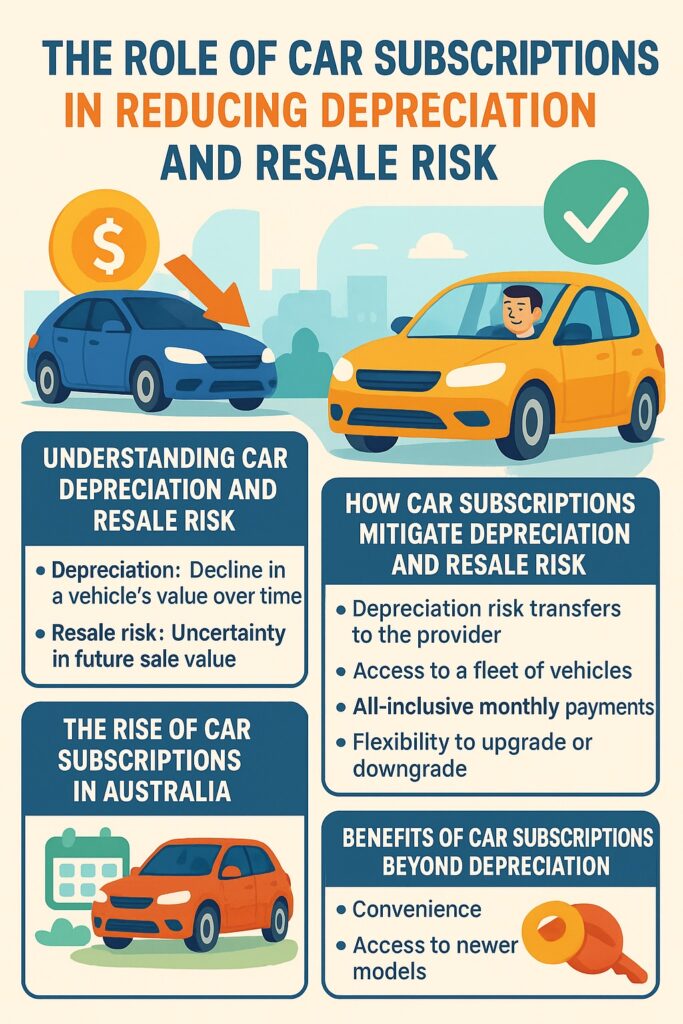The Role of Car Subscriptions in Reducing Depreciation and Resale Risk
In the ever-evolving automotive landscape, traditional car ownership is increasingly being challenged by innovative models like car subscriptions. These services offer a flexible, all-inclusive alternative to buying or leasing a vehicle, addressing common concerns such as depreciation and resale risk. This blog delves into how car subscriptions mitigate these issues, with insights from Trend Rentals Australia, a leading provider in the field.

Understanding Car Depreciation and Resale Risk
Depreciation refers to the decline in a vehicle’s value over time, influenced by factors like age, mileage, condition, and market demand. For instance, a new car can lose up to 30% of its value within the first year. This rapid depreciation poses a significant financial risk for owners, especially when trying to sell or trade in their vehicle.
Resale risk is the uncertainty associated with how much a vehicle can be sold for in the future. Factors such as market trends, brand reputation, and vehicle condition play crucial roles. For example, electric vehicles (EVs) have been experiencing faster depreciation rates compared to traditional vehicles, primarily due to rapid technological advancements and evolving consumer preferences.

How Car Subscriptions Mitigate Depreciation and Resale Risk
Car subscription services, like those offered by Trend Rentals Australia, provide a model where consumers pay a fixed monthly fee to access a vehicle without the burdens of ownership. This arrangement significantly reduces exposure to depreciation and resale risk in several ways:
1. Depreciation Risk Transfers to the Provider
When subscribing to a vehicle, the responsibility for depreciation lies with the service provider, not the consumer. This means that subscribers are not affected by the vehicle’s declining value over time, as they would be in traditional ownership scenarios.
2. Access to a Fleet of Vehicles
Subscription services often offer a variety of vehicles within their fleet. Subscribers can switch between models based on their needs, ensuring they always have access to the latest technology and features without worrying about the long-term value of a single vehicle.
3. All-Inclusive Monthly Payments
Most car subscription services bundle costs like insurance, maintenance, and registration into a single monthly payment. This predictability helps consumers manage their budgets effectively and eliminates unexpected expenses associated with vehicle ownership.
4. Flexibility to Upgrade or Downgrade
Subscribers have the flexibility to upgrade or downgrade their vehicle choice based on changing needs or preferences. This adaptability ensures that individuals are not stuck with a depreciating asset that no longer suits their lifestyle.

The Rise of Car Subscriptions in Australia
In Australia, companies like Trend Rentals Australia are at the forefront of the car subscription model. They offer a wide range of vehicles, from compact cars to larger commercial vehicles, catering to diverse customer needs. Their services are designed to provide flexibility, convenience, and cost-effectiveness, making them an attractive option for both individuals and businesses.
Benefits of Car Subscriptions Beyond Depreciation
While reducing depreciation and resale risk are significant advantages, car subscriptions offer additional benefits:
- Convenience: Subscribers enjoy the ease of having a vehicle without the hassles of ownership, such as maintenance and paperwork.
- Access to Newer Models: Subscription services often update their fleets, allowing subscribers to drive newer models with the latest features.
- Sustainability: By promoting shared vehicle usage, car subscriptions contribute to reducing the number of vehicles on the road, leading to lower emissions and less traffic congestion.
Conclusion
Car subscriptions present a compelling alternative to traditional car ownership, especially for those concerned about depreciation and resale risk. By shifting the responsibility of vehicle value retention to the service provider, consumers can enjoy the benefits of driving a car without the financial uncertainties associated with ownership. Services like Trend Rentals Australia exemplify how this model can be effectively implemented, offering flexibility, convenience, and cost savings to a broad customer base.
For more information on car subscription services and to explore available options, visit Trend Rentals Australia.